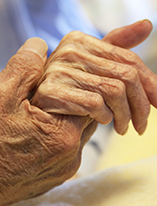I Wish I'd Known Earlier...Palliative Care Is Not a Mandate Not to Treat
| August 13, 2013

This post was contributed in response to Jessie Gruman's What I Wish I’d Known Earlier about Cancer Survivorship series about the unique needs and responsibilities of people who have been diagnosed and treated for cancer.
When I signed up for palliative care in 2011, after many years of living with advanced breast cancer and my pre-existing, rare genetic disorder, I thought I’d made my last medical decisions. In the future I’d take the least-invasive, lowest-cost approach to medical care and forego the dramatic, expensive treatments — conventional and alternative — that had worn me down over many years.
If only life with advanced cancer were so simple!
I found a wonderful, local palliative care physician, completed my pink POLST form and decided no more extreme measures (surgery, EMT visits, CPR, the ICU, life support, etc.).
Though I’d made sensible decisions, in early 2012 I had to consider major surgery that would neither prolong my life nor alleviate my worst symptom — shortness of breath due to cancerous tumors and fluid around my lung. But it would ease pain, protect my lung from collapse and allow me to eat. That is, if it succeeded. If five specialists and the tumor board agreed with one another or even themselves. And if I agreed with them.
More than ten weeks passed with lung drainings, imaging tests, repeat consultations and many reversals of recommendations.
Finally, they all agreed that I was a good candidate for surgery to seal my lung. I was expected to survive more than a few weeks, my quality of life should improve and I would be able to avoid emergency lung drainings.
But did I agree? The personal benefits appeared to outweigh the personal risks, but what about other risks, other costs?
It would be an all-expense paid trip, because I’m what’s known as a dual-eligible: All of my medical expenses are covered by Medicare and Medicaid. I’m among the poorest of the poor and the sickest of the sick. At age 55, I’d been in that system for 13 years and knew I’d face no personal financial cost. But I am part of the social body, just as I’m part of the ecological body. A procedure like this would cost thousands of dollars.
I’ve tracked my medical expenditures for decades. For many years I was uninsured, then underinsured, had employer-paid insurance, on COBRA, in the state’s High Risk Pool, waited 29 months for Medicare after Social Security approval, on Medicare, depleted my life savings and thus became eligible for Medicaid (assets under $2,000). Each year I tally the costs of my medical care and they usually average between $20,000 - $50,000. 2012 topped out at $125,000. Quite a jolt, given my poverty level income and assets.
Though I no longer pay out-of-pocket, I still care about costs. I try to be wise, take good care of “my health”, and to avoid the ER, high cost treatments and expensive scans. It’s just that cancer is a very expensive disease with increasingly expensive treatments.
Having endured over 40 surgeries, it was difficult to decide on another. Though I was inwardly prepared to die, the fluid around my lung wouldn’t kill me soon, just further disable me, requiring ever-stronger pain control and more frequent drainings.
So, I chose surgery.
Then, two more cancer treatments failed.
But, ten months ago, I began taking a small amount of estrogen daily in a counter-intuitive treatment of estrogen positive cancer. Gradually the cancer became stable, and now I live in suspended animation between life and death.
The cost of this seeming miracle treatment? $12 per month. This low-cost, low-tech, low-complication treatment is a better fit for my personal values and for taxpayer wallets.
My current health management isn’t invasive, expensive treatment, but co-creating a sustainable death at my country home. Friends and family have joined together in a circle of care to serve during my illness and dying. Lacking the more traditional supports of partner and offspring, I rely on others’ loving kindness to keep me moving in my right direction — from overtreatment to release from life.
I wish I had understood earlier on that palliative care is an approach to medical decision-making, not a mandate not to treat. When the time comes to transfer from palliative care to hospice care, I hope there will be no more dramatic, expensive options. I hope life and death become ever more simple and sustainable.
For more information on palliative care and paying for care, see our 'Be a Prepared Patient' Plan for Your End of Life Care and Pay for Your Health Care resources.










